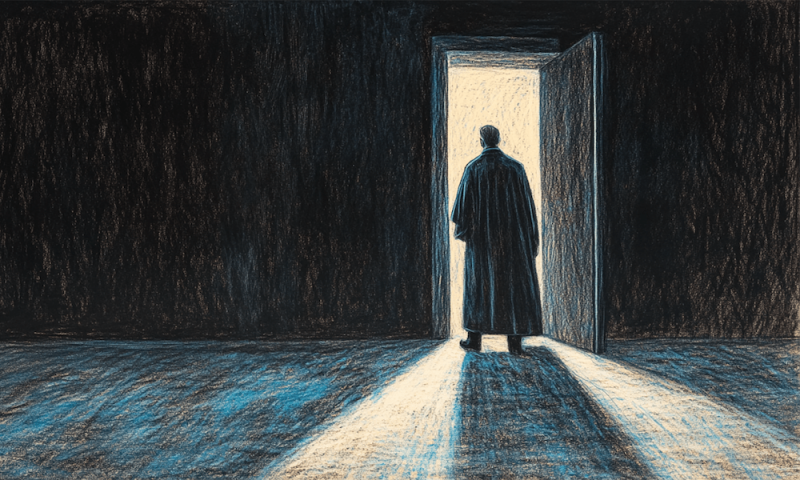If Qazi Faez Isa has a legacy, it’s one where decrepit dynasties are kept on life support, where the gloved hand salutes our sunny democracy, and where judges now wait, limbs trembling, to be chosen.
Ever since they brought out that word, we stood warned.
“Reputed judicial maverick sworn in as new chief justice,” said Stratfor. “Pakistan’s maverick chief justice aims to restore court’s credibility,” said the Christian Science Monitor. “Justice Qazi Faez Isa — Pakistan’s judicial maverick,” said Dawn.
On and on it went: here was a rebel, a daredevil, a correction to the post-Saqib era. That the word itself belonged to Samuel Maverick, a Texan rancher whose main act of defiance was refusing to brand his cattle (rather than free his slaves) wasn’t mentioned.
If anything, the m-word invoked a more modern hero: Top Gun’s Pete ‘Maverick’ Mitchell — that rule-breaking, head-tossing navy pilot from back when the Cold War was still a thing.
It’s a film so furious, viewers forget that Captain Maverick’s rebellion is limited to silly personality quirks; that he never questions the broader agenda of the military-industrial complex; and that any tension he does have with the deep state is always resolved in the latter’s favour. If Maverick is a rebel, it’s little more than a cinematic device.
But then such comparisons didn’t apply: for much of the op-ed class that welcomed him, the brother judges that saved him, and a public horrified by how he’d been persecuted during the tabdeeli years, Qazi Faez Isa would change the country.
He did — just not in the way they had in mind.
Which is why October 25, his last day in office, had a run-up of its own — countdown clocks ticked to the minute of his exit, bar leaders announced their Day of Liberation, and a fellow judge observed the chief justice’s verdicts were better off focusing on the law rather than attacking his predecessors.
As for the state of the country, it was hard not to recall Louis XV, also coronated on October 25, who shrugged to his subjects, “Apres moi, le deluge (after me, the flood)”.
Because the chief justice leaves behind a Constitution adrift, civil freedoms upended, and judicial independence in tatters — with three successive chief justices of the future already denied from (or resigned prior to) the big chair.
If there’s any praise to be had, it comes from the ruling party, gushing over his Lordship from the floor of a rigged house. Certainly, it’s praise well-merited — for the executive, it’s been a year of fantasy football, topped off with a glorious climax: the 26th Amendment.
For everyone else — those of us screaming into the void throughout his term, and others who thought their silence would serve them better — who cares? All that’s left is to pick through the wreckage.
Bad beginnings
Though easy to forget now, it was quite remarkable that a Chief Justice Isa happened at all: the PTI government, at the behest of its then-backers, had tried to destroy his career — if for no other sin than calling out the deep state over the Faizabad dharna in 2017.
“Justice Qazi Faez Isa has crossed multiple invisible but very tangible red lines,” wrote lawyer Saroop Ijaz at the time, “and is now facing the consequences.”
Yet he survived: nothing if not tenacious, the judge fought the reference against him to the end; a last-minute rescue via review decision (led by Justice Syed Mansoor Ali Shah) kept his ascent intact. Some months later, Imran Khan — freshly ousted from power — would admit the reference had been “a mistake”.
But that mistake’s biggest casualty would be the Supreme Court: in judging their fellow judge, neither side escaped unscathed. For the review majority, a brave man and his family had been witch-hunted without remorse. For the dissenting judges, the family’s foreign properties had failed to pass the smell test, or the FBR’s tax men.
Whichever side you were on, the only result of that toxic, two-year case was a court left bruised, vulnerable, and mutually suspicious. The only winner, as ever, was the deep state.
Hence, also, hope for a new day: who better than Justice Qazi Faez Isa — having made it past his own baptism of fire — to fend off the dark side, and protect his brethren on the bench?
Or so it was thought.
Pliancy and procedure
That hope was first tested with the Practice and Procedure Act: when the Bandial Court had called for elections in 90 days, the ruling Sharif-Bhuttos had rushed to table a bill declawing the judiciary (a teaser trailer for the 26th amendment).
And when Chief Justice Bandial’s bench suspended the law before it could be passed, his soon-to-be successor had questions of his own. “Whether it was appropriate,” wrote Justice Isa, “for the Hon’ble Chief Justice to hear cases pertaining to his own powers?”
It was so appropriate, in fact, that after becoming chief justice, his Lordship would take up the case as his first innings, mark it to a full bench, preside over it himself, and even livestream it on YouTube.
As far as curtain raisers went, however, it was a bit of a drag: even at the best of times, questions of court procedure can be dull and dry. But its effects promised to be far-reaching: the new law had set out to neuter the chief justice’s one-man suo motu powers, by spreading it out over a committee of three judges.
Fortunately, Justice Isa had been clear from his days at the Balochistan High Court, “Save the Chief Justice,” he had held in High Court Bar Association vs Government of Balochistan, “individual judges should not take suo motu notice, to avoid confusion and possibly contradictory orders being passed in respect of the same matter.”
As Chief Justice of Pakistan, however, the judge felt otherwise, and the suo motu was handed over to the new committee.
The procedure law’s other feature, that suo motu rulings could be appealed to larger benches, was even more ridiculous — changing the Constitution via ordinary legislation. In simple terms, a rump assembly was dong all this without a two-thirds majority, by dressing it up as a matter of mere procedure.
Yet even here, Justice Isa had called it correctly beforehand: in Malik Shakeel vs Sheikh Rasheed, he had written, “Precedents of this Court have held that the right of appeal is a substantive right and not one of mere procedure.”
But by the time he was actually deciding the procedure law, the now-chief justice had a change of heart again. Whether such appeals were procedural or not, we never found out, because he never answered the question. “This Court does not generally dilate upon academic propositions,” His Lordship held in Raja Amer Khan vs Federation.
The challenge was dismissed, and the Act sailed through — dubbed a great win for democracy, the trash-fire law was now on the books. Its most glaring absurdities were never engaged with, like Justice Ayesha Malik’s point that no larger bench could possibly hear an appeal from an original full bench — what could be fuller than the fullest possible?
We were instead told that suo motus could be appealed without amending the constitution (they couldn’t); that the law would democratise case fixation (it didn’t); and that this wasn’t a gateway for the state to ingress (it was).
All of which would be thrown in sharp relief just months later, when President Asif Ali Zardari swapped out the third senior member of the procedure committee, in favour of any judge of the chief justice’s choosing.
Just like that, case fixation slipped out of the judiciary’s hands and into the executive’s. And just like that, Justice Munib was replaced by Justice Aminuddin, as per his Lordship’s fancy. “History stands witness to the fact that when power is concentrated in an individual,” Justice Isa had written in Raja Amer, “disastrous consequences invariably follow.”
In which case, guess it was back to history. Hence, also, the short life of the original Practice and Procedure Act — at all times a Trojan horse for the state to control judges, and to squeeze in an appeal for itself as an escape hatch.
The executive would quickly prise open that hatch too: when the Supreme Court struck down military trials of civilians, the procedure law’s maiden voyage saw the judgment frozen by a larger bench. All in all, quite the win for democracy.
Election blues
In a recent letter recounting his own accomplishments (“I had no desire to list what has been achieved but to stem a false narrative …”), the chief justice highlighted “ensuring the return of democracy and that the elections were held throughout the country on 8 February 2024.”
This came as a relief to read: a year prior, not long after the Bandial court had ordered elections in 90 days in two provinces, Justice Isa had been questioned about the crisis at Shifa Tameer-e-Millat University. “Aren’t elections a matter of enforcing fundamental rights?” his host had asked.
“Fundamental rights are enshrined in a chapter of the Constitution,” Justice Isa replied. “There is no argument or debate about which is one and which is not … right to education, freedom of expression, right to information. Tell me which of these is that provision … I’m having a general discussion with you … I will ask you, which fundamental right?”
Surely, this was Article 17: right to association and, by extension, the right to choose one’s representatives. Or perhaps the judge was speaking in generalities.
Either way, his actions would more than fill in the blanks: five weeks after Chief Justice Bandial took suo motu notice of the delay in the polls, Justice Isa ordered via another bench that suo motus be suspended altogether — at least until rules regulating case fixation could be framed.
“The Constitution did not grant the Chief Justice unilateral and arbitrary power to decide the above matters,” he held. Not for the last time, the judge would prioritise arcane rules of procedure over the future of Pakistan’s democracy.
And that future would suffer some more: now chief justice, his Lordship accepted the election commission’s hilarious excuses as to why polls couldn’t be held and — forgetting all talk of 90 days (as demanded by the Constitution in the bluntest terms) — signed off on whatever day the bureaucrats felt like. That would be February 8, the ECP having defied all previous polling dates from 2023: 30 April, then 14 May, then 8 October.
None of this merited a single sentence in the majority verdict. “The matter of the holding of general election on 8 February 2024 stands resolved,” the chief justice declared in Supreme Court Bar Association vs Federation.
Maybe he was right: maybe the system had taken enough of a beating, and it was best to look ahead. “No one should now put forward any pretext to derail democracy,” his Lordship added. And yet none could imagine that the major pretext for derailment would come from the chief justice himself.
Because the next case requires no introduction: few verdicts have been more ludicrous in reasoning, more corrosive in outcome, and more damaging for democracy than the bat symbol ruling of January 13, stripping Pakistan Tehreek-i-Insaf, the country’s largest party, of its electoral sign right before the polls.
It’s an old saying that hard cases make for bad law. How tragic was it, then, that an easy case would make for such bad law; where the facts were obvious, and the text already decided by far larger benches (eleven and twelve judges in the twin Benazir Bhutto decisions)?
Over the next several months, the fable of the misunderstood chief justice, his misunderstood short order, and his misunderstood detailed reasons, would echo on air. And yet one need look no further than lawyer-activist Jibran Nasir’s tweet the night of the verdict to know how obvious the consequences were going to be: that each PTI candidate would require a different symbol; that ‘independents’ would be free to float in any direction even if they managed to push past the assembly doors; and that their reserved seats were in jeopardy. In sum, akin to “disenfranchising tens of millions of voters across Pakistan”.
Yet even here, the voter would shock the system: despite disenfranchisement before and rigging after, the PTI won a plurality.
And the Supreme Court got to pick up some of the slack: in Sunni Ittehad Council vs Election Commission, it found for the will of the people — that elected representatives be allowed their rightful strength in the assembly — and allotted the party its share of reserved seats.
The court even found itself baffled by the original sin of January 13: deciding the bat symbol verdict on the same day that tickets were to be submitted and symbols allocated, held Justice Mansoor Ali Shah, “and that too without clarifying that the said decision did not affect the electoral status of PTI and its candidates, also contributed in causing confusion and prejudice to PTI, its candidates, and the electorate”.
Yet it must be said here that the court solved a problem entirely of its own making: at no point had Qazi Faez Isa been a lone actor. Had the same unity of purpose been on display during the 90-day election judgement (can anyone forget, when the bench should have been rallying behind the Bandial court, that utterly goofy 3-2, 4-3 fistfight?), the challenge to the bogus procedure law, or the formation of SC benches that would roadblock Lahore’s election tribunals, the country would have been in a much better place today.
What it got instead was polls rigged to the point of a national farce, the Rawalpindi commissioner accusing the chief justice of complicity, and the chief justice casually strolling outside and chatting with Vloggers: “What do I have to do with the election? Waqai? Kaun hain yeh sahib?”
His Lordship could be forgiven for not keeping up with the news. What wasn’t as understandable was his walling off the tribunals formed by the Lahore High Court’s chief justice Malik Shahzad Ahmad Khan soon after, for hearing and deciding the countless election petitions that had sprung out of the mess of February 8.
That they were manned by some of the High Court’s finest judges, including Justices Shahid Karim and Anwaar Hussain, was a credit to Justice Shahzad. It was something less for his Lordship, who quickly set aside the tribunals’ notifications, in yet another win for the ECP.
As for all the scorn heaped on his most memorable opinion (“Sadly, the ghost of chief justice Munir is alive and kicking in 2024,” wrote lawyer Faisal Siddiqi of the bat symbol verdict), his Lordship was unamused. “… Snide remarks against the judgment are not acceptable,’ Justice Isa said during the Sunni Ittehad hearing.
But whether his bat verdict would ever get the love and affection it deserved, the ruling on reserved seats would provoke an eyeball-melting response of its own. Having been outvoted 8-2 (and, by another metric, 8-2-2-1), Justice Isa could do little more than dissent.
Or, even better, he could haul up the ECP he so admired, for refusing to implement the majority ruling.
He didn’t.
Instead, Justice Isa ruled that, by dint of the majority’s subsequent clarifications, the original ruling wasn’t final. And because it wasn’t final, it shouldn’t be implemented! “Since the appeals were not finally decided, there was no decision which could be stated to be binding …” he held.
Even the rocklike ECP was thrown a lifejacket: “Similarly,” wrote Justice Isa, ’contempt of court proceedings for any non-compliance of the ‘order of the Court’ … cannot be initiated.“
As far as dissents went, this travelled some distance beyond personal pique; it was the sort of stuff that razed institutions to the ground — a sitting chief justice encouraging the state to defy the (lawful) orders of the highest court in the country. His own court. His own country.
“He has little regard for the judgments of this Court,” the majority author, Justice Mansoor Ali Shah, would write elsewhere, “and has contemptuously and unashamedly suggested that they may not be implemented by the executive.”
As of this writing, His Lordship’s suggestion prevails: the reserved seats remain where they are, poll rigging remains unreversed, and an entire constitutional amendment has been magicked out of a fictional universe.
On his last day in office, Justice Isa praised the new amendment’s “clean environment” provision. And why not.
Life sentences
For context, Article 62(1)(f) had been green-lighted by the Zia assembly’s Eighth Amendment. At the time, it read, “A person shall not be qualified to be elected or chosen as a member of Parliament unless … he is sagacious, righteous and non-profligate, honest and ameen.”
The problem was obvious: what counted as honest or ameen? This was also its own silver lining: Article 62(1)(f) seemed much too vague to ever ruin the lives of our political class. Why worry about being ameen when there was no legal mechanism that could say otherwise?
That changed, ironically enough, with the 18th Amendment. Rather than repealing 62(1)(f), our democrats gave it teeth: a candidate wouldn’t be qualified now unless he was “… honest and ameen, there being no declaration to the contrary by a court of law.”
The effect was immediate: the courts got involved. The timing didn’t help either; Justice Iftikhar Chaudhry was riding a wave of populist anger, and his bench went on to disqualify a string of lawmakers.
But that’s also what the Constitution plainly said: unlike other parts of Articles 62 and 63, parliament had written in no time limit. As long as a court has declared to the contrary, a candidate would remain unqualified.
Which is why this contributor also wrote in these pages, “If there is unhappiness with the law, it would be best to change it via parliament — rather than pray it be misread.”
But misread it was: cometh the hour, cometh the man. While overturning lifetime disqualification, Justice Isa erased Article 62(1)(f), saying the provision was “non-self-executory’“and didn’t mean what it plainly said: that a court of law could declare a candidate dishonest.
Justice Isa’s decision didn’t reinterpret 62(1)(f); it deleted it outright. That the same jurist had felt the opposite some years ago was now par for the course: “… Every part and every word of the Constitution is significant and an interpretation that renders any word or provision meaningless must be avoided,” he had held in the District Bar case.
Further back, the Balochistan High Court’s Justice Isa had decided in Obaidullah vs Rind that the even broader Article 62(1)(d) meant disqualification “is not time-related, but perpetual…Individuals must take responsibility for their actions”.
When his own ruling in Obaidullah was put to him as precedent, Chief Justice Isa said he had been bound back then, as a high court judge, by the apex court’s pronouncements (only, his high court verdict was from 2011, whereas the Supreme Court’s was authored several years later).
Regardless, the sole saving grace came from Justice Yahya Afridi’s clear, convincing dissent: that the 18th Amendment was a watershed, that its changes required preserving, and that parliament had clearly intended to lend no time limit to disqualification.
Besides, held Justice Yahya, “Declaring Article 62(1)(f) non-executory would most certainly render the very provision redundant, and that would be affront to the most basic principles of interpretation of constitutional provisions.”
Justice Isa might have agreed. Chief Justice Isa did not.
Kitchen heat
While hearing petitions to do with missing persons, his Lordship was unimpressed by what a PTI lawyer said the party was having to endure.
“There is an English phrase ‘if you can’t stand the heat in the kitchen, you should not be in the kitchen,’ he said, mangling Harry Truman (a gent who thought to nuke the whole kitchen rather than set foot in it.)
But it was hard to stay as glib when the call started coming from inside the house. On March 26, six judges of the Islamabad High Court wrote an explosive letter to the Supreme Judicial Council, documenting instance after instance of interference, surveillance, and coercion by the deep state.
Here it was: the sheer courage of the Islamabad judges had brought the system to a 2007 moment. And it had drawn a bright line: between those in favour of restoring the justice system’s credibility, and those complicit in its suppression.
It’s just that 2007 had Iftikhar Chaudhry. 2024 had Faez Isa.
“Since I’ve been chief justice,” he told the Sindh High Court Bar Association a month later, “I have not received a single complaint from any high court judge that there has been interference in their work. If there has been interference in their work, it has not been reported to me.”
A few days afterward, the judge blamed the victim, “In my opinion, the greatest threat to the independence of the judiciary was from [within] the Supreme Court, not from the outside.”
But whether inside or out, it wasn’t arrested in either case: the unprecedented resignation of senior puisne judge Ijaz-ul-Ahsan, next in line for the top job, was one such example — and it went unaddressed. Perhaps his Lordship was too busy hearing cases that week: by pure chance, the bat symbol verdict was announced two days after his difficult successor exited the scene.
An exit that came on the heels of another: Justice Mazahar Ali Akbar Naqvi’s. Whatever the merits of the state’s case against him, the fact remains that Justice Naqvi was being pursued for the exact same reason Justice Isa had been once: for falling foul of the powerful.
And yet not Justice Naqvi’s harshest critics could claim he was afforded the same hearing: Qazi Faez Isa vs President of Pakistan had been a slow-motion marathon, one heard by 10 judges over two years, with the Supreme Judicial Council shut down at its end.
Justice Naqvi was afforded just three judges, all of whom kept the council going, and then had to face the rather novel scenario where the council (as chaired by his Lordship) kept inquiring into him even after he had resigned.
One is free to argue that Justice Isa and Justice Naqvi’s cases were wildly different. One is free to argue the guilt of one, and the innocence of the other. One is free to be anguished by several of Justice Naqvi’s verdicts, as this writer has been.
But due process is also beyond such stupid arguments: it is blind to personality, privilege, or public opinion. Either Justice Isa was entitled to Justice Naqvi’s treatment, or Justice Naqvi merited Justice Isa’s. That wasn’t the case here.
Or, for that matter, elsewhere: in receipt of the letter of the Islamabad six, Justice Isa’s response was to speak to his fellow judges, speak to the bar, speak to the attorney-general, and ultimately, speak to the prime minister.
The net result was that hapless, boys’ club fix to every problem: the one-man inquiry. Only here, the executive missed a beat — it decided to go with the great and good former chief justice Tassaduq Hussain Jillani, whose quiet integrity spoke volumes of its own.
Justice Jillani would promptly recuse himself: “… The Honourable Chief Justice of Pakistan, being a paterfamilias [head of the family], may address and resolve the issues raised in the letter at the institutional level.”
This was also the correct position: the Islamabad letter was not addressed to Justice Jillani; it was not addressed to the attorney-general; and it was not addressed to the prime minister’s men.
It was meant for the Supreme Judicial Council, with Justice Qazi Faez Isa’s name emblazoned at the top of the letterhead. Its first few words read, “We are writing to seek guidance …”
And once Justice Isa made the conscious decision to do little about it, the Islamabad High Court was left to fend for itself — just as so many other judges had been. What could have been history curdled into indifference.
Jawwad S Khawaja returns
The past is another country, the old saw goes; they do things differently there.
One such case study is from a decade ago, when Pakistan was beset by wave upon wave of suicide bombings. In District Bar Association, Rawalpindi vs Federation, the Supreme Court went ahead by 11-6 to sanction military courts for trying terrorists.
In the minority were two future chief justices, Jawwad S Khawaja and Qazi Faez Isa. Siding with Justice Khawaja’s dissent (“… I am in complete agreement with his opinion“), Justice Isa held, “The Constitution does not permit trials of civilians by the military as it would contravene fundamental rights…”
Lending support to this conclusion was the most revered figure in Pakistani pantheon. On February 6, 1919 — Justice Isa would cite — Muhammad Ali Jinnah had risen up against an emergency powers bill on the floor of the Imperial Legislative Council in Delhi.
“… It is against the fundamental principles of law and justice,” said the Quaid, “namely, that no man should lose his liberty or be deprived of his liberty, without a judicial trial in accordance with the accepted rules of evidence and procedure.”
And if they were to pass such a brutal law, Jinnah said, “you will create in this country from one end to the other a discontent and agitation, the like of which you have not witnessed, and it will have, believe me, a most disastrous effect upon the good relations that have existed between the government and the people.”
A parliamentarian of the highest skill, the Quaid brought his speech home, “It is quite clear and it is obvious that this measure is of a most serious character. It is dangerous. It imperils the liberty of the subject and fundamental rights of a citizen and, my Lord, standing here as I do, I say that no man who believes in the freedom and liberty of the people can possibly give his consent to a measure of this character.”
In its young and fragile history, the Supreme Court of Pakistan has at times lent consent to such measures (F B Ali and District Bar); at other times it hasn’t (Liaquat Hussain).
And yet there’s always been a Pakistani ready to do the right thing, despite the odds. In 2023, coming out of retirement to challenge the latest variant of military courts, was Jawwad S Khawaja — the 23rd chief justice of Pakistan. The same would be true of Salman Akram Raja, as it would be true of Aitzaz Ahsan.
“History is the best teacher,” Justice Isa once remarked in open court. But history is also much more: in its dark humour, in its tricks of light, in how its abyss is large enough to hold us all.
Having agreed with Jawwad S Khawaja’s dissent against military trials for civilians, his Lordship now found himself having to decide the very same issue eight years later, in the case aptly titled Jawwad S Khawaja vs Federation.
But that never ended up happening: when the Bandial Court formed a bench to hear the case, Justice Isa walked out. “Courtroom No.1 of the Supreme Court was left stunned on Thursday,” reads journalist Nasir Iqbal’s report in these pages, “with bitter polarisation among judges coming to the fore, after chief justice-designate Qazi Faez Isa said he did not consider the nine-member bench hearing appeals against military trials ‘a proper court’.”
It goes on, “When Justice Isa stood up from his seat on the bench, everyone, even a visibly disturbed Chief Justice Umar Ata Bandial seated next to him, asked Justice Isa to remain seated.”
To no avail: per Justice Isa’s reasoning, until the status of the (then-pending) procedure law was decided, he would not participate in any bench. The hearing was adjourned, and the bench broken up.
And while this was fair enough, it was difficult not to reread Mr Jinnah’s 1919 speech: “… My Lord, it is no use shirking the issue, it is no use hedging round the whole of this question.” Was the Quaid addressing someone in the future?
In any event, his Lordship did not join the bench even after the procedure law was upheld. The difference couldn’t be starker: the Justice Bandial-appointed bench, now headed by Justice Ijaz-ul-Ahsan, struck down military courts; the Justice Isa-appointed appellate bench suspended the original verdict, and then didn’t decide it. (This was also leaving aside the fact that Justice Ijaz deemed the new bench’s formation a violation of the much-revered procedure law.)
Writing for a dual majority in the original decision, Justice Ayesha — who has steadily emerged as one of the clearest-eyed jurists on the Supreme Court — held, “The facts in these Petitions are unique and unfortunate, however, they do not justify the trial of civilians before a military court for offences which can be tried before ordinary courts.”
Or, as Justice Isa had held not so long ago in District Bar, “The military, which is a part of the executive, cannot conduct criminal trials because judicial power can only be exercised by the judiciary.”
But the past is another country. They do things differently there.
26th Disbandment
It was around the end of the Isa court’s term that it was able to make its core contribution; namely, to the 26th Amendment. No less than the biggest reversal for judicial independence in three decades, the amendment ensures the post-Musharraf consensus is officially over.
By the grace of a Supreme Court decision — Justice Isa’s review of the dissident lawmaker’s vote being counted in the assembly — the doors were thrown open to the dark. To be clear, many, including this writer, disagreed with the original verdict regarding Article 63-A: it was difficult to see how the plain text of the Constitution prohibited dissident votes from being counted.
But the review was fixed just days after an amendment seeking to destroy the Supreme Court failed to pass; the review bench was formed without Justice Munib, despite Justice Isa having expressly held that review petitions were always heard by the author of the original verdict; and the bench itself was the gift of a presidential ordinance.
There was also the small fact of it coinciding with opposition members alleging all-out coercion: once the numbers were complete, the rump assembly ran to vote. Unimaginable under any of the nine chief justices post-restoration — going all the way back to Iftikhar the First — the amendment got a free pass.
Hence our new normal: the executive gets to choose its judges, including those that will hear the state’s cases. The executive gets a say in removing judges it doesn’t like. The executive gets to evaluate judges and their work, including those that may decide against it. And the executive gets to pick a favourite chief justice from a hat, via a pool of three lucky contestants. This also ensures a game of thrones every few years, thus wrecking a court that was until now immune to such intrigue.
Not least, judges that were confirmed as future chief justices as late as last week may have already stood purged, in favour of a system that will naturally prefer the pliant and the partisan. Whoever’s handed this crown of thorns will also be bereft of the suo motu, which has been killed off in its entirety.
That this was done to curtail judicial overreach, itself on a consistent downward slide since the reign of Saqib Nisar, is a poor excuse. Amid state failure, it was a series of judicial actions in the public interest — elections in 90 days, the letter of the Islamabad six, the striking down of military trials of civilians, the Lahore High Court’s election tribunals — that required the executive’s hacksaw. The rest is propaganda.
And yet the centre was telling the truth when it said October 25 would have to be the final cutoff date: either the amendment made it past the finish line before then, or it never made it at all. The difference would be one judge. “We had a window,” the co-chair of the Pakistan Peoples Party told BBC, “of a man who wouldn’t undermine what we were doing.” In fact, such an amendment “would not have been possible in the presence of any other chief justice.”
Which is truly the crowning jewel of his Lordship’s career: an amendment so brazen, none else could have been thought so safe a pair of hands.
Worst-ever?
So where has the Isa court left us?
By one measure, it’s had a tough act to follow: whether history hates them or hails them, yesterday’s chief justices have been quite successful in advancing their vision for the country.
Chief Justice Isa’s verdicts, however, are already proving transient. Part of this is down to their content: the shallow reasoning; the unaddressed questions; the misapplied precedent; and random, ad hominem attacks.
To paraphrase the literary critic Becca Rothfeld, a judgment is not “a flimsy feeling or a personal preference, but a fortress buttressed by arguments”. They endure as a result of “marshaling evidence, while everyone else seethes with inarticulate, pre-rational affinities”. And affinities cannot last.
Consider: His Lordship undid lifetime disqualification and paved the way for Nawaz Sharif’s return to the ballot box; Sharif lost from one constituency, is alleged to have lost the second, and then retreated into semi-seclusion.
His Lordship stripped the PTI of its electoral symbol and wiped the bat from the rolls; the party swept the elections using dolphins, shuttlecocks, chimtas, and charpoys — in one of the biggest upsets in our political history. At no other time has the public so utterly defied a judicial outcome without disobeying it.
His Lordship thought to award the PML-N with reserved seats well above their proportion; he was outnumbered by eight other judges, in a full-court drubbing that has few parallels for a presiding chief justice. Outvoted fair and square, he then railed against its implementation.
His Lordship thought to avenge Zulfikar Ali Bhutto’s hanging, but held the original verdict had attained finality and couldn’t be overturned. The judge’s lone concession, that the late prime minister’s rights had been infringed, resembled a lecturer debating college sophomores; a similar look was had when chasing the ghost of Pervez Musharraf.
To be fair to Justice Isa, he showed tremendous courage in checking the powerful — if power can be taken to mean retired judges, dead generals, and Monal Restaurant.
In the ultimate assessment, the Awami Workers Party’s Ammar Rashid said he couldn’t “think of a single judge who did more damage to the country in my lifetime”. Few can. For most young lives, his Lordship’s only competition comes from Dogar — and Dogar isn’t considered a chief justice in the first place.
If Qazi Faez Isa has a legacy, it’s ushering in a new era of subordination, in service of an old order: where decrepit dynasties are kept on life support, where the gloved hand salutes our sunny democracy, and where judges now wait, limbs trembling, to be chosen.
Header illustration by Abdul Sattar Abbasi







